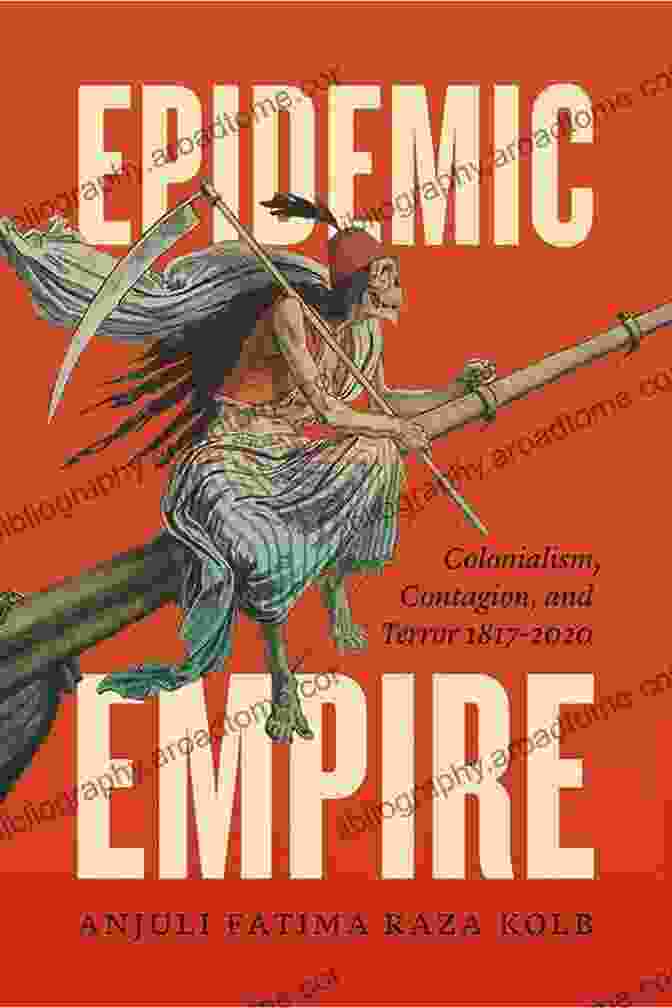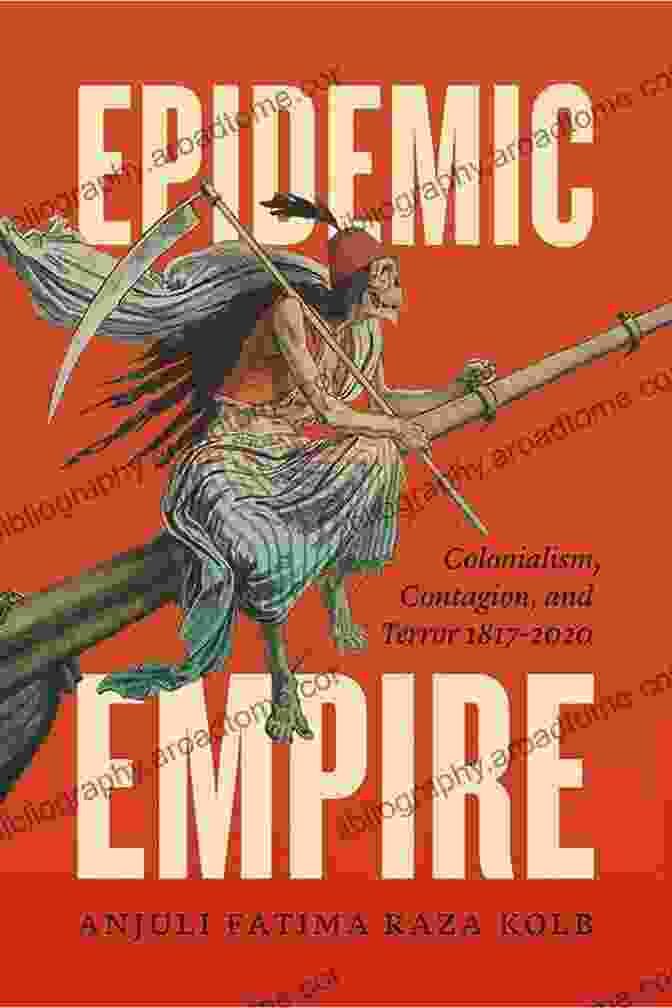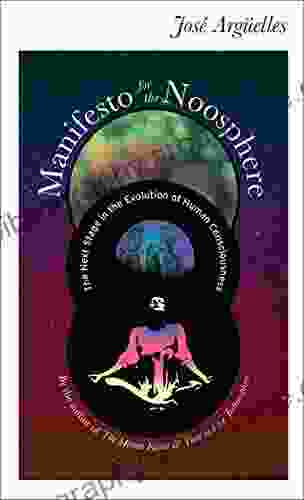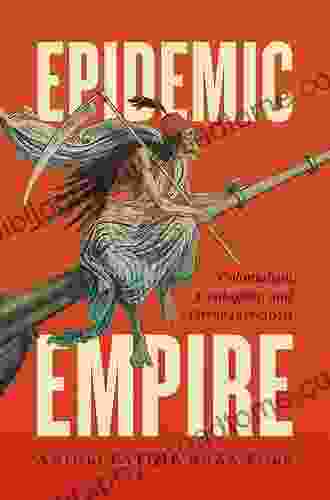Epidemic Empire: Unveiling the Colonial Roots of Global Health Crises


A Critical Examination of Colonialism's Impact on Global Health
In the wake of the devastating COVID-19 pandemic, it is imperative to critically examine the historical roots of global health crises. Dr. Akhil Gupta's groundbreaking work, "Epidemic Empire: Colonialism, Contagion, and Terror, 1817-2024," offers a profound analysis of the intricate relationship between colonialism and the spread of infectious diseases.
5 out of 5
| Language | : | English |
| File size | : | 5149 KB |
| Text-to-Speech | : | Enabled |
| Screen Reader | : | Supported |
| Enhanced typesetting | : | Enabled |
| Word Wise | : | Enabled |
| Print length | : | 412 pages |
| Lending | : | Enabled |
This comprehensive text delves into the historical record, spanning over two centuries, to uncover the insidious ways in which colonial powers exploited and manipulated disease outbreaks to maintain their control and advance their imperial ambitions.
Colonialism: A Breeding Ground for Disease
Gupta argues that the conditions created by colonial rule, such as forced labor, overcrowding, and malnutrition, created a fertile ground for the emergence and spread of infectious diseases. The exploitation of indigenous populations and the disruption of their traditional ways of life weakened their immune systems, making them more susceptible to pathogens.
Moreover, colonial powers often used disease to their advantage. By controlling access to medical resources and information, they could isolate and quarantine certain populations, suppress dissent, and justify their authoritarian rule. The history of smallpox, cholera, and plague is replete with examples of colonial governments using disease as a tool of oppression.
The Legacy of Colonialism in Modern Pandemics
The legacy of colonialism continues to plague global health today. The inequities and vulnerabilities created by colonial rule have persisted in many postcolonial societies, contributing to the persistence of disease and the emergence of new pandemics.
Gupta emphasizes that understanding the colonial roots of modern health crises is crucial for developing effective and equitable responses. By addressing the historical and structural factors that perpetuate health disparities, we can break the cycle of vulnerability and promote a more just and sustainable future for global health.
Key Themes in Epidemic Empire
Gupta's work explores several key themes that shed light on the complex relationship between colonialism and disease:
- Disease as a Weapon of Control: Colonial powers used disease to subjugate indigenous populations, suppress resistance, and maintain political dominance.
- The Medicalization of Colonialism: Colonial authorities justified their actions by claiming they were bringing modern medicine to "backward" societies, while simultaneously exploiting and neglecting local knowledge and practices.
- The Global Spread of Disease: Colonialism facilitated the movement of people and goods across vast distances, leading to the spread of new and existing diseases across continents.
- The Continuing Legacy of Colonialism: The historical injustices and inequities created by colonialism continue to shape health outcomes in postcolonial societies, contributing to the persistence of disease and the emergence of new pandemics.
li>The Disruption of Indigenous Healthcare Systems: Colonial powers disrupted traditional healthcare systems and introduced Western medicine, which often proved ineffective or even harmful in local contexts.
Call to Action
Epidemic Empire is a powerful indictment of colonialism and its devastating impact on global health. By exposing the historical roots of modern-day pandemics, Gupta challenges us to confront the enduring legacy of colonialism and to work towards a more just and equitable future.
This text is a must-read for scholars, policymakers, and anyone who seeks to understand the intricate relationship between history, power, and disease. It is a clarion call for action, reminding us that the health of humanity is inextricably linked to the pursuit of justice and the eradication of colonial legacies.
About the Author
Dr. Akhil Gupta is an acclaimed anthropologist, medical historian, and professor at the University of California, Los Angeles. His groundbreaking research focuses on the intersections of colonialism, health, and social inequality. Epidemic Empire is his latest and most comprehensive work, offering a profound analysis of the colonial roots of global health crises.
Free Download Your Copy Today
Free Download your copy of Epidemic Empire today and delve into the groundbreaking work of Dr. Akhil Gupta. This essential text will challenge your assumptions, broaden your understanding of history's impact on global health, and inspire you to advocate for a more just and equitable future.

5 out of 5
| Language | : | English |
| File size | : | 5149 KB |
| Text-to-Speech | : | Enabled |
| Screen Reader | : | Supported |
| Enhanced typesetting | : | Enabled |
| Word Wise | : | Enabled |
| Print length | : | 412 pages |
| Lending | : | Enabled |
Do you want to contribute by writing guest posts on this blog?
Please contact us and send us a resume of previous articles that you have written.
 Book
Book Novel
Novel Page
Page Chapter
Chapter Text
Text Story
Story Genre
Genre Reader
Reader Library
Library Paperback
Paperback E-book
E-book Magazine
Magazine Newspaper
Newspaper Paragraph
Paragraph Sentence
Sentence Bookmark
Bookmark Shelf
Shelf Glossary
Glossary Bibliography
Bibliography Foreword
Foreword Preface
Preface Synopsis
Synopsis Annotation
Annotation Footnote
Footnote Manuscript
Manuscript Scroll
Scroll Codex
Codex Tome
Tome Bestseller
Bestseller Classics
Classics Library card
Library card Narrative
Narrative Biography
Biography Autobiography
Autobiography Memoir
Memoir Reference
Reference Encyclopedia
Encyclopedia Mary Wingo
Mary Wingo Graham Salisbury
Graham Salisbury Scarlet Keys
Scarlet Keys Samuel C Weaver
Samuel C Weaver Eric Shaw Quinn
Eric Shaw Quinn Francesco Da Vinci
Francesco Da Vinci Clarence Watkins
Clarence Watkins Elsevier
Elsevier Eric J Bolland
Eric J Bolland Rachel Hanna
Rachel Hanna Phil Chalmers
Phil Chalmers Felixia Wade
Felixia Wade Evelina Weidman Sterling
Evelina Weidman Sterling Marcus A Pfeiffer
Marcus A Pfeiffer Eunique Divination
Eunique Divination Rudy Sarzo
Rudy Sarzo Naomi Thompson
Naomi Thompson Evangeline Holland
Evangeline Holland Romano Guardini
Romano Guardini Michelle Spaul
Michelle Spaul
Light bulbAdvertise smarter! Our strategic ad space ensures maximum exposure. Reserve your spot today!

 Earl WilliamsUnlock the Power of Storytelling: Essential Techniques for Video and Cinema...
Earl WilliamsUnlock the Power of Storytelling: Essential Techniques for Video and Cinema...
 E.M. ForsterThe Next Stage In The Evolution Of Human Consciousness: A Manifesto for a New...
E.M. ForsterThe Next Stage In The Evolution Of Human Consciousness: A Manifesto for a New... Ed CooperFollow ·13.6k
Ed CooperFollow ·13.6k Joshua ReedFollow ·14.7k
Joshua ReedFollow ·14.7k William GoldingFollow ·16k
William GoldingFollow ·16k Stan WardFollow ·5.7k
Stan WardFollow ·5.7k Matt ReedFollow ·17.4k
Matt ReedFollow ·17.4k Elliott CarterFollow ·19k
Elliott CarterFollow ·19k Israel BellFollow ·2.5k
Israel BellFollow ·2.5k Mikhail BulgakovFollow ·11.5k
Mikhail BulgakovFollow ·11.5k

 Troy Simmons
Troy SimmonsStories From The Life Of Baha: A Must-Read For Spiritual...
Discover the Inspiring Teachings and Enriching...

 Wesley Reed
Wesley ReedDuke Review of MRI Principles: Case Review - Your Gateway...
Unveiling the Essence...

 Ralph Waldo Emerson
Ralph Waldo EmersonThe Big Book of NFTs: Your Ultimate Guide to the Digital...
In the rapidly evolving world of digital...

 Jason Hayes
Jason HayesUnveiling the Labyrinth: The Cheat Sheet Novel and its...
In the realm...
5 out of 5
| Language | : | English |
| File size | : | 5149 KB |
| Text-to-Speech | : | Enabled |
| Screen Reader | : | Supported |
| Enhanced typesetting | : | Enabled |
| Word Wise | : | Enabled |
| Print length | : | 412 pages |
| Lending | : | Enabled |












